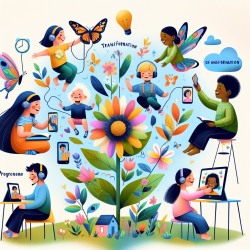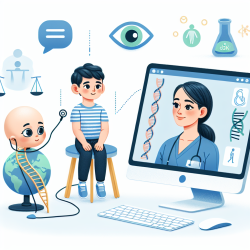Introduction
As professionals in the field of speech-language pathology and online therapy, it is crucial to continuously seek innovative strategies that enhance service delivery and client outcomes. The research article "Challenges in Founding and Developing Medical School Student-Run Asylum Clinics" provides valuable insights into overcoming operational challenges, which can be adapted to improve therapy services for children in schools.
Understanding the Challenges
The study identifies five key challenges faced by Student-Run Asylum Clinics (SRACs): volunteer recruitment, clinical operations, case volume, institutional support, and leadership. These challenges are not unique to SRACs and can be paralleled in the context of providing online therapy services to schools.
Volunteer Recruitment
Recruiting and retaining qualified volunteers is a common challenge. SRACs have addressed this by expanding recruitment initiatives and offering remote training options. For online therapy services, consider broadening your recruitment pool by including non-traditional candidates and providing flexible training opportunities to attract and retain skilled therapists.
Optimizing Clinical Operations
Efficient scheduling and operations are critical. SRACs have optimized their processes through technological innovations and direct communication between stakeholders. Similarly, online therapy services can benefit from leveraging technology to streamline scheduling and enhance communication between therapists, schools, and families.
Managing Case Volume
Fluctuating case volumes require adaptive strategies. SRACs have established referral networks and centralized scheduling to balance caseloads. For online therapy services, developing strong partnerships with schools and implementing flexible scheduling systems can help manage varying demands effectively.
Securing Institutional Support
Institutional support is vital for sustainability. SRACs have successfully navigated institutional challenges by clarifying their objectives and adopting neutral names to avoid political perceptions. In online therapy, clear communication of goals and benefits to educational institutions can foster supportive partnerships.
Strengthening Leadership
Effective leadership is crucial for overcoming challenges. SRACs have expanded leadership teams and documented operations to ensure smooth transitions. Online therapy services can benefit from similar strategies, such as mentoring new leaders and maintaining comprehensive operational documentation.
Conclusion
By learning from the experiences of SRACs, online therapy practitioners can implement data-driven strategies to overcome common challenges and improve service delivery. These insights can lead to more effective therapy outcomes for children in schools, ensuring they receive the support they need to thrive.
To read the original research paper, please follow this link: Challenges in Founding and Developing Medical School Student-Run Asylum Clinics.










